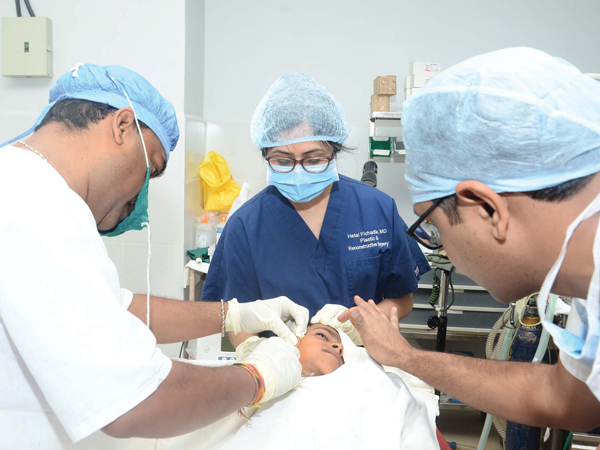
What inspired you to participate in these mission trips?
My dad is a general surgeon in India and is really passionate about service. He has organized these trips in conjunction with Rotary International for 38 years, so I grew up in this environment. It’s a yearly event – patients know when it’s happening and will plan for it.
When he started these trips, he would request surgeons from abroad or from big cities like Mumbai to come. Today, there are more plastic surgeons nearby who can travel there more easily and volunteer their time. I try to go whenever I can, although it’s harder now that I have two young daughters.
What kinds of procedures did you perform?
We treated burn contractures around the neck, hands, and elbows, open wounds, patients with cleft lip and palate and other congenital facial differences.
Veraval is a small coastal town with no access to plastic surgeons for few hundred miles. Because these conditions are not life-threatening, patients will put off treatment when they don’t have access to a local doctor or the money to travel to a plastic surgeon. But waiting affects their quality of life, because they can’t straighten their arm or they have a cleft lip.
We don’t see that degree of severe burn contractures here in Portland because of early, adequate care for burn victims.
What is the experience like for patients?
The patients don’t pay for anything. A local government hospital opens up their operating rooms for us, and local donors provide food for patients and their families. Most patients end up staying for one or two nights as they have traveled from far away. The youngest was about 10-months-old and the oldest was in her sixties, and they were all incredibly brave.
What was the most meaningful part of the trip for you?
I loved collaborating with other surgeons and I learned a lot from both them
and the patients. I was really impressed by everyone’s resilience and hope in the
face of adversity.
I always encourage other doctors to look into similar opportunities, but it’s important to go with an organization that has experience and is able to provide follow-up care to these patients. It’s not helpful if it’s a onetime thing where you go in, operate, and leave. Patients need to have follow-up options available if they need revision or if they need a second planned surgery.